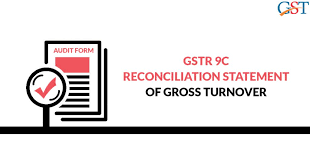GSTR-9C – Reconciliation Statement

GSTR-9C – Reconciliation Statement is a crucial return under the Goods and Services Tax (GST) regime in India. It is essentially a reconciliation statement between the audited financial statements of a taxpayer and the annual return (GSTR-9) filed.
✅ What is GSTR-9C?
GSTR-9C is a statement of reconciliation between:
GSTR-9 (Annual Return) filed for a financial year, and
Audited Annual Financial Statements of the taxpayer.
It also includes certification by a Chartered Accountant (CA) or Cost Accountant, verifying the accuracy of the information.
???? Who has to file GSTR-9C?
As per the latest updates from CBIC (Central Board of Indirect Taxes and Customs):
Every registered taxpayer whose aggregate turnover exceeds ₹5 crore in a financial year must file GSTR-9C.
Taxpayers under composition scheme or Input Service Distributors (ISD) are not required to file it.
???? Contents of GSTR-9C
GSTR-9C has two major parts:
Part A: Reconciliation Statement
This includes:
Reconciliation of turnover declared in audited financial statements with turnover declared in GSTR-9.
Reconciliation of tax paid.
Reconciliation of Input Tax Credit (ITC).
Any additional liability arising out of the reconciliation.
Part B: Certification
This part must be certified by a CA or CMA.
There are two formats:
Format I: Where the reconciliation is done by the same auditor who conducted the statutory audit.
Format II: Where it is done by a different auditor.
???? Due Date
Usually due by 31st December following the end of the financial year (i.e., FY 2023-24 due by 31st Dec 2024), unless extended by government notification.
???? How to File GSTR-9C
Download the offline utility tool from the GST portal.
Fill in the required details using the audited financials and GSTR-9.
Generate JSON and upload it to the GST portal.
Digitally sign the return using a Digital Signature Certificate (DSC).
File it online.
❗ Important Notes
GSTR-9C cannot be revised once filed.
Mismatch in reconciliation can result in audit or notices from GST authorities.
Filing GSTR-9C after the due date may attract penalties under the GST Act.
